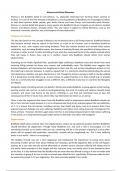Ahimsa and Ethical Dilemmas
Ahimsa is the Buddhist belief in non-violence, i.e., physically refraining from harming others (animal or
human). It is one of the Five Precepts in Buddhism, a set of guidelines all Buddhists are encouraged to follow
to help them become better people, gain better Karma and more Punya, and eventually reach Nirvana.
Ahimsa is a central belief that governs many aspects of a Buddhist’s life as it impacts on job choices, medical
choices, and dietary choices, amongst others. This also means it applies to ethical dilemmas, such as the
treatment of animals, abortion, war, and weapons of mass destruction.
Treatment of Animals
The key idea based on the concept of Ahimsa is to not directly harm or kill living creatures. Buddhists believe
that because animals may be reborn in the future as a God or as a human, and so therefore should be
treated as such, with respect and loving kindness. They also believe humans and animals have certain
similarities, such as having Buddha-nature, the chance of reaching Nirvana, the possibility of being reborn as
a human or other animal. Cruelty and killing of any kind also cause bad Karma to the people involved which
they will repay in future lives, and so is another reason why Buddhists should refrain from animal
abuse/cruelty.
According to the Noble Eightfold Path, specifically Right Livelihood, Buddhists must also refrain from work
involving killing animals for these very reasons and undoubtedly more. The Buddha even suggests that
butchers/abattoirs will themselves be slaughtered in their next life, just as they slaughtered animals in this
life (referring to Karma). However, it could be argued that it is mainly the intention behind killing the animal
that determines whether one gains bad karma or not. Though the action is wrong in itself, it may be justified
if it is being done to help others (e.g., to earn money to support family), or to help oneself (e.g. to provide
food to a community that struggles to eat a different diet, a difficulty many face in countries like Mongolia
and Nepal).
Alongside simply not killing animals, the belief in Ahimsa also leads Buddhists to going against animal testing,
wearing animal skin and fur, as well as hunting/poaching. Any kind of cruelty and violence towards living
creatures will cause bad Karma to the person inflicting it, and they will ultimately have to face the
consequences of this in future lives, where they may themselves be reborn as an animal.
There is also the argument that comes from the Buddhist belief in compassion, where Buddhists should not
kill or harm animals simply because it is not a compassionate thing to do, and goes against the very definition
of it. It is known that all animals, including humans, fear death and injury, and so to prevent them from
experiencing such feelings and such suffering, Buddhists will refrain from eating meat out of compassion for
those animals. However, intention again plays into this: is one being compassionate to help reduce suffering
in this world, or to help themselves gain better Karma? Is the latter not rather self-indulgent?
Vegetarianism:
Buddhist beliefs about animals stem into vegetarianism, where we are called to question whether Buddhists
should therefore be vegetarians. Though many Buddhists are, and such a diet is encouraged, it is not
something essential as no matter what you eat, something will die in the process of getting it to your plate:
plants will be sprayed with pesticides, insecticides, animals will be slaughtered, etc. This is how suffering
works in our world – there is no escaping it.
The Buddha himself was not a strict vegetarian and emphasised the importance of caring more about
becoming a better person than about fretting over keeping a perfectly vegetarian diet, as this will happen
anyway, be it you who eats the animal afterwards or another person, because suffering will always exist in
this world. Many members of the Sangha will also consume meat, but mainly only if it was donated to them
by the laity. It is also believed that the Buddha only ate meat that was offered as long as it was not made with
the intention of giving it to him so that no animals were killed for him, specifically. If food was made for him,
he would only accept it if it was vegetarian. This same principle applied to his monks.




